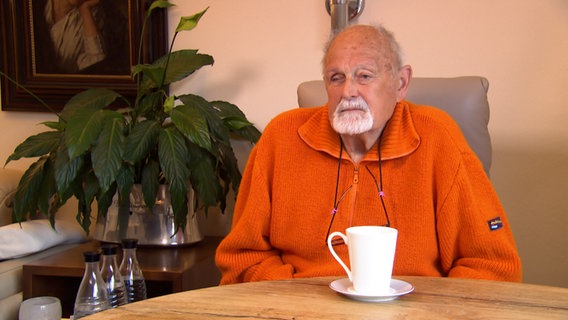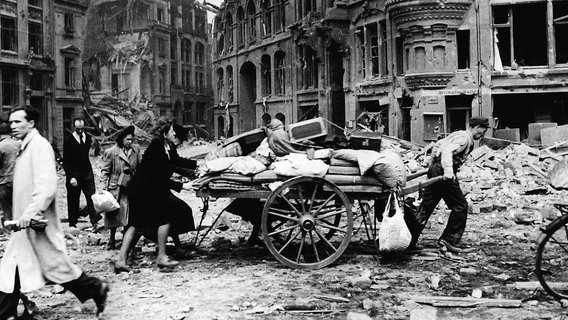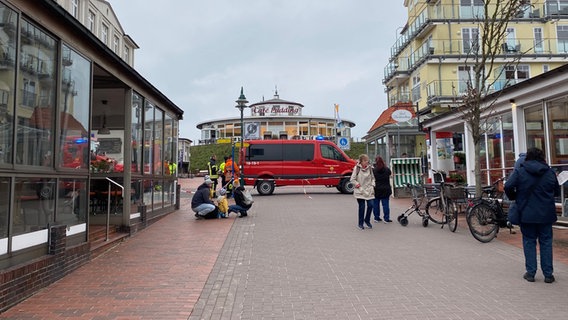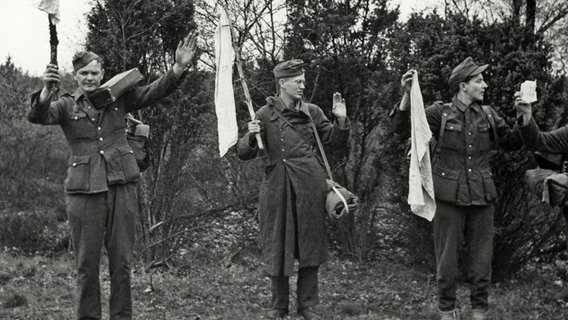Status: 05/08/2023 09:49 am
On May 8, 1945, the Second World War ended. Just a few days earlier, the East Frisian island of Wangerooge had been badly hit by a bomb attack. The island had previously been declared a “fortress” by the National Socialist rulers. Perhaps the last contemporary witness of this attack is Friedrich Wilhelm Petrus. 86-year-old Wangerooger doesn’t want the story of this disaster to be forgotten. He informs tourists on special tours about the last days of the war on the island. He told the NDR in Lower Saxony how he personally remembered the events of April 25, 1945 and the time afterwards. At that time – it is a Wednesday around 5 p.m. – 482 British, Canadian and French bombers reached the small island. Friedrich Wilhelm Petrus is playing with his friends by the water at the time:
A funny buzz
311 people died on April 25, 1945 on Wangerooge.
“It was a beautiful day, the sun was shining, it was warm. Then we heard a strange whirring, it got louder and louder, then one of us looked up and then we knew immediately what the hour was about. We dropped everything and started running straight away.
A soldier pulled Peter into the basement
We couldn’t run away from the planes. The first thing I saw were two dead people. And a dead dog. Then a house blew up behind me. Then one more. And one more thing. The last thing that rumbled behind me were the roof tiles from the Clemens house. Then a soldier pulled me into the basement. Then I was safe.
Biting powder smoke over the island
All my friends got home safely. When we came out of the basement, there was a fog over the whole island. Biting gunpowder that made your eyes water, you could hardly breathe. Everyone came out of their holes and looked – what was that anyway?
The Canadians are coming

Friedrich Wilhelm Petrus does not want the horror of that day to be forgotten.
Then events unfolded. The occupying forces came, here it was the Canadians. One rang our bell and asked for my father. He was arrested, he belonged to the leadership at the time. We haven’t heard from him for two years and didn’t know where he is. Then he suddenly stood in front of the door again. The time in between was tough.
311 people have died
The survivors found a lot of dead people. They buried her wherever they found her. So there were a lot of dune diggers. 311 people have died. To date, not one has been found. In 1951 the War Graves Commission came, dug them all up again and buried them in a roundabout. This is today the honorary cemetery.
The barracks were not hit
The islanders had no time to mourn, they had to get their things in order. They went into the dunes with handcarts, there was the Friedrich-August barracks – miraculously not hit by bombs. They broke up the barracks. There was everything here: complete windows with frames, toilets, sinks. Many old Wangerooger houses are built with stones from these barracks.
The dog takes care of the Sunday roast
We had nothing. But we were inventive. I asked my mother: May I have a dog? The neighbor’s dog had puppies. I was allowed to. I called him “mermaid”. Eventually we let the dog run. Back then, Wangerooge was full of rabbits. We were amazed at how fast Nixe could run. At some point he came back and had torn a rabbit. That was the sign that from now on we would have a Sunday roast every Sunday.
Fishing with hand grenades
We were little sprouts. We tried fishing with hand grenades. It was all full of ammunition on the island. We went to the eel pit and then threw in hand grenades that had been fired. Then there was a terrible bang, and then we had endless fish. We supplied the whole neighborhood with fish.
mason jars from glass mines
We didn’t have any jars more, then we had an idea: there were stacks of glass mines on the airfield, all you had to do was remove the lid and carefully pour out the glass mine. We had built a special device for this, and then you had a mason jar.
Children didn’t think about it then
I think children are very good at suppressing terrible things. That was normal for us back then. If we saw a dead person in a crashed plane, then so be it – and we moved on. We didn’t think at the time that this person might be missing somewhere, might have a family.”
Further information




